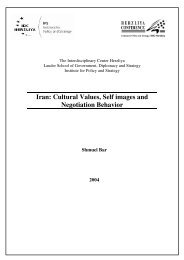Bashar's Syria: The Regime and its Strategic Worldview Shmuel Bar ...
Bashar's Syria: The Regime and its Strategic Worldview Shmuel Bar ...
Bashar's Syria: The Regime and its Strategic Worldview Shmuel Bar ...
You also want an ePaper? Increase the reach of your titles
YUMPU automatically turns print PDFs into web optimized ePapers that Google loves.
Bashar’s <strong>Syria</strong> 405statements. 121 His behavior raises questions as to what extent he has a strategy—eitherthat which he inherited or of his own—which goes further than preservation of the regime.In any case, Bashar’s foreign policy behavior at the present stage is clearly defensive <strong>and</strong>reactive. It includes: Attempts to reach a modus vivendi with Washington, at least so as not to provide apretext to the United States or Israel to step up their campaign against the regime.Bashar seems resigned to American hostility to his regime, <strong>and</strong> does not seem tobelieve that there is an option for a stable positive relationship with the United States,at least under the present administration. Attempts to improve relations with Russia <strong>and</strong> Europe as a counterbalance to thehostility of the United States. This policy—at least on the European front—hassoured in the wake of the murder of al-Hariri <strong>and</strong> the rupture of his relations withFrance. Cultivating the strategic relationship with Iran, much as Bashar attempted to lean onIraq before the war. Dangling the prospects of gradual democratization (by the presidential elections of2007) <strong>and</strong> warning of the chaos that would emerge from regime change, in order todeter attempts to remove the regime. Occasional willingness to renew negotiations with Israel <strong>and</strong> restrain the pro-<strong>Syria</strong>nPalestinian factions. Attempts to create “nuisance value” for <strong>Syria</strong> by measured support of the Iraqiinsurgency, along with signals that he may change that policy in return for a suitablepolitical (<strong>and</strong> economic) compensation.IsraelTo judge by <strong>Syria</strong>n rhetoric, Israel is by far the prime strategic concern of the regime inDamascus. While the occupation of the Golan Heights is the official rationale for <strong>Syria</strong>’senmity toward Israel, <strong>Syria</strong>n hostility toward Israel goes much further. Israel is portrayed asa cunning, aggressive, evil foreign entity implanted in the heart of the Arab world, plottingto take over the entire Arab homel<strong>and</strong>—from the Nile to the Euphrates, <strong>Syria</strong> included.Alongside the hostility to Israel, <strong>Syria</strong> has also promoted wider anti-Semitism throughpublication of books such as <strong>The</strong> Protocols of the Elders of Zion.Nevertheless, <strong>Syria</strong> had made progress toward acceptance of some sort of peace agreementwith Israel during the 1990s <strong>and</strong> up to Hafez al-Asad’s death. Toward the end of the1990s Hafez al-Asad (like Bashar after him) declared that the peace option is <strong>Syria</strong>’s “strategicoption,” though he <strong>and</strong> other spokespeople from the regime took care not to give theimpression that <strong>Syria</strong> had ab<strong>and</strong>oned the military option. It is difficult to assess whether ornot Hafez al-Asad was really reconciled with the idea of a full peace (with diplomatic relations<strong>and</strong> normalization) with Israel. However, <strong>Syria</strong>n positions in the negotiations seemedto indicate that he had crossed that Rubicon <strong>and</strong> many Israelis who had been involved inthe negotiations received that impression from their <strong>Syria</strong>n interlocutors.However, even if this is so, it is not to be taken for granted that this acceptance of thefact of Israel’s existence was passed on to Bashar. Upon his ascendancy to the presidency,some officials in Israel expected that Bashar would be more receptive to peace with Israelthan his father had been. This expectation was in line with forecasts that Bashar, by virtueof his youth <strong>and</strong> Western orientation, would initiate a process of democratization, or at leastliberalization, in <strong>Syria</strong>. <strong>The</strong> assumption was that if Bashar indeed desired to turn to the
















